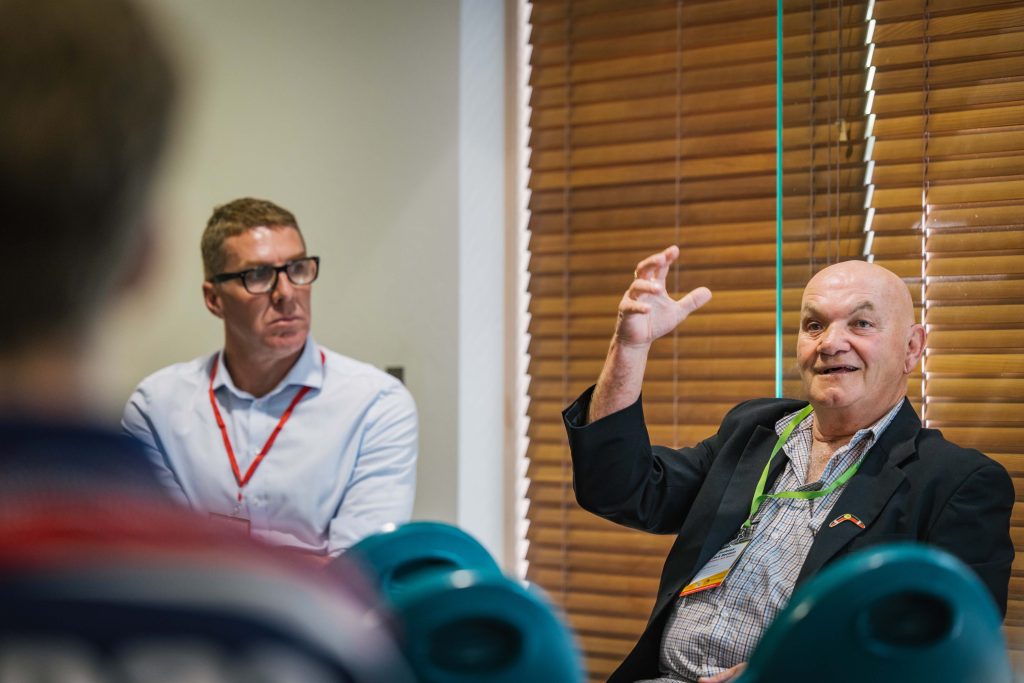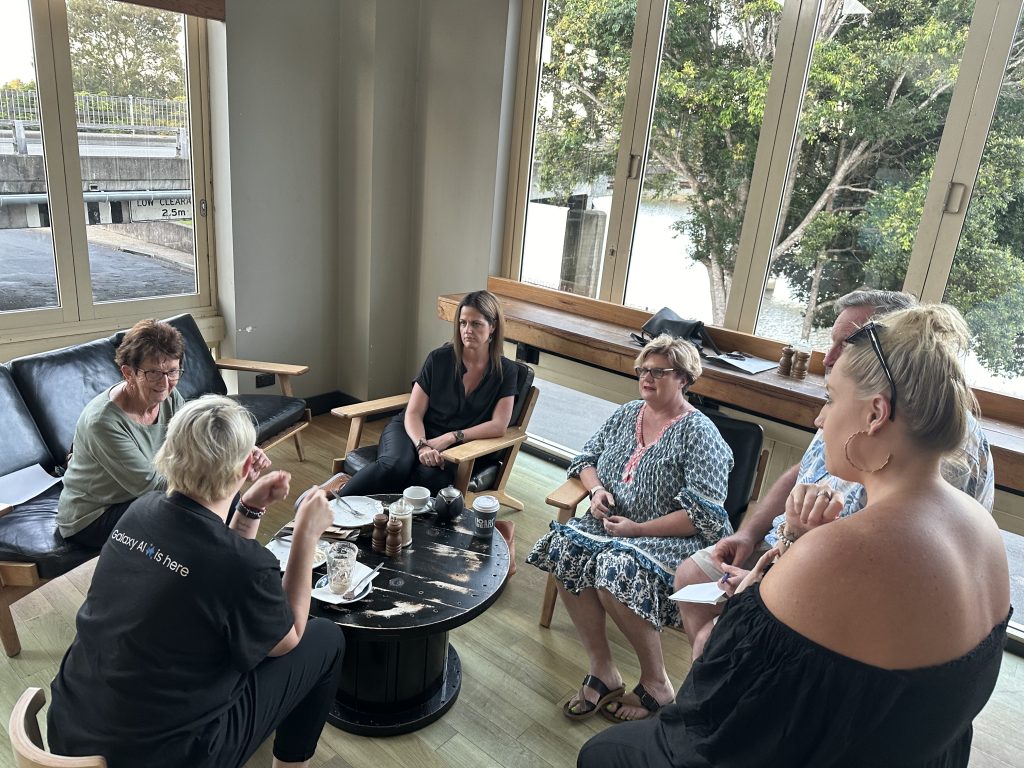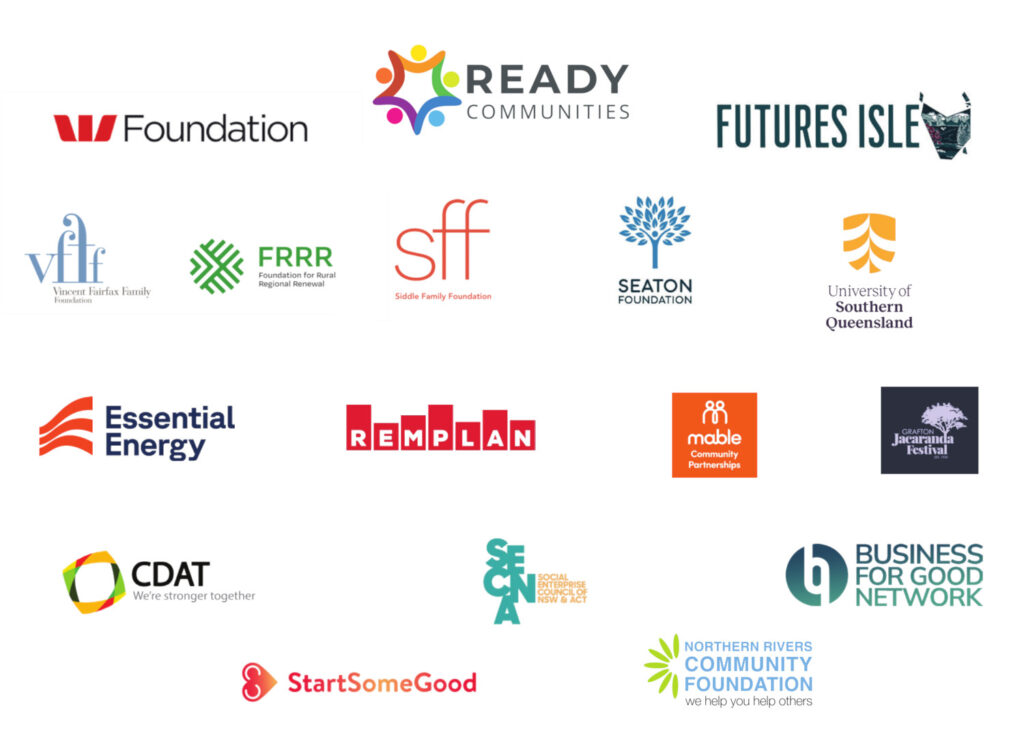What an absolute treat to have our own media team at this year’s SIITR25.
The following post was written by communications specialist and storyteller Justine McClymont who is based on Bundjalung Country in the NSW Northern Rivers.
Social Impact in the Regions 2025 — Day Two: As You Were
From Ideas to Impact
It’s one thing to think about change, but how do we actually move into action?
Day Two of the Social Impact in the Regions Conference in Grafton, NSW, invited delegates to explore this question; not just intellectually, but through the growing connections and lived experiences shared across sectors and communities.
How do we move from reflection to regeneration, from ideas to impact? And how do we look after ourselves and each other in the process?
Panel One: Getting the Rubber to the Road, Moving into Action
Moderated by Kylie Flament (CEO, Social Enterprise Council for NSW & ACT), the panel featured Marcus Watson (CEO, BackTrack), Dr Dimity Podger (Co-founder, Regen Labs) and Crystal Taylor (Mission Australia).
Each speaker shared grounded insights from their work across regional and remote communities: from BackTrack’s youth engagement in Armidale, to Regen Labs’ regenerative place-based initiatives, to Mission Australia’s support for remote Indigenous communities.
What united the ideas and conversation was a shared belief that action doesn’t begin with a perfect plan. It starts with people — and the momentum to begin.
Crystal spoke about the power of collective momentum, noting that “acting together builds the muscle for creating change”.
“It unlocks things that already exist in the community,” she said.
She urged participants to “find the people, not just with professional skills but with the soft skills”.
Marcus said there was great value in acting quickly on ideas. “Get the ball rolling, so that people can see the vision,” he said.
For him, impact isn’t measured by metrics alone — it’s the community that will “keep score” on whether change is real and lasting.
Dimity offered a gentle provocation for changemakers: that sometimes, the most powerful thing a changemaker can do is listen. “When working with local projects, you need to be a bit quiet and ask the curious questions,” she said.
Throughout the discussion, speakers returned to the idea that communities already hold the answers — if we’re willing to notice. Crystal encouraged people to see the diversity of skills and assets that already exist in a community, and to ask: “What are the ways of knowing and being? What are the places that bring joy?” She cautioned against gatekeeping, saying, “Don’t be gatekeepers of who can participate in the conversation.”
Marcus reminded us that scale isn’t the starting point. “I think you can start smaller than you ever think you can,” he said.
Panel Two: The Work of Healing
Following the morning’s action-focused panel, the next session invited participants to slow down and reflect on what sustains us — individually and collectively — in the work of social change.
The Work of Healing panel conversation asked: What does it mean to care for ourselves while caring for community?
Convened by Dr Geoff Woolcock (University of Southern Queensland), this panel featured Julia Keady (Benefolk), Father Jesse Poole (Anglican Parish, Kempsey) and Paul Dutton (First 2000 Days Programs Manager, Grafton).
Together, they explored the emotional and cultural dimensions of wellbeing in our work, and the need to embed healing into our workplaces, lives and communities.
Julia opened with a message that we need to recognise the toll that purpose-driven work can take. She spoke of Benefolk’s mission to improve the health and wellbeing of the social impact workforce, raising real concerns about stress, overwhelm and burnout across the sector.
Building on this, Paul shared reflections from his time travelling through, working and spending time on Country — and listening deeply. “Why don’t we teach how to look after ourselves?”
Father Jesse suggested it’s about “living well and being well”. He encouraged people to see how wellness can shape and form their work. He also encouraged people to find opportunities to step away, rest and reconnect with what brings joy.
The conversation often returned to the idea that healing must be built into the way we work, not considered an afterthought. Paul asked, “Why don’t we have healing built into workplace contracts?”
He closed with a powerful reminder: “You have to listen to Mother Earth. Slow down and connect.” His words reinforced the idea that healing isn’t something extra, it’s a necessary part of how we live, work and ultimately grow.
Breakout Sessions: Learning for Regional Impact
For the rest of the day, participants joined breakout rooms to learn from others who are working and investing in regional communities.
Topics included developing community capital, navigating systems, skills for place work, using data for decision-making, podcasting for impact and tracking community wellbeing.
After lunch, the sessions continued with a focus on impact investment, youth leadership, co-design through a First Nations lens, employment-generating social enterprise and leading in the regions.
Closing Thoughts: Starting with Care
Day Two was a poignant reminder that meaningful change in regional communities begins with relationships, care and the courage to start.
It’s time to build systems that support not just our communities but also sustain and nurture the people in the social impact workforce for the long term.
Justine McClymont is a communications specialist and storyteller based on Bundjalung Country in the NSW Northern Rivers. She works across environment, climate, sustainability and social change, helping good-hearted people and organisations tell better stories to drive positive impact. You can find her at justinemcclymont.com
Featured image: Paul Dutton and Julia Keady pic by Jay Black (And The Trees)




